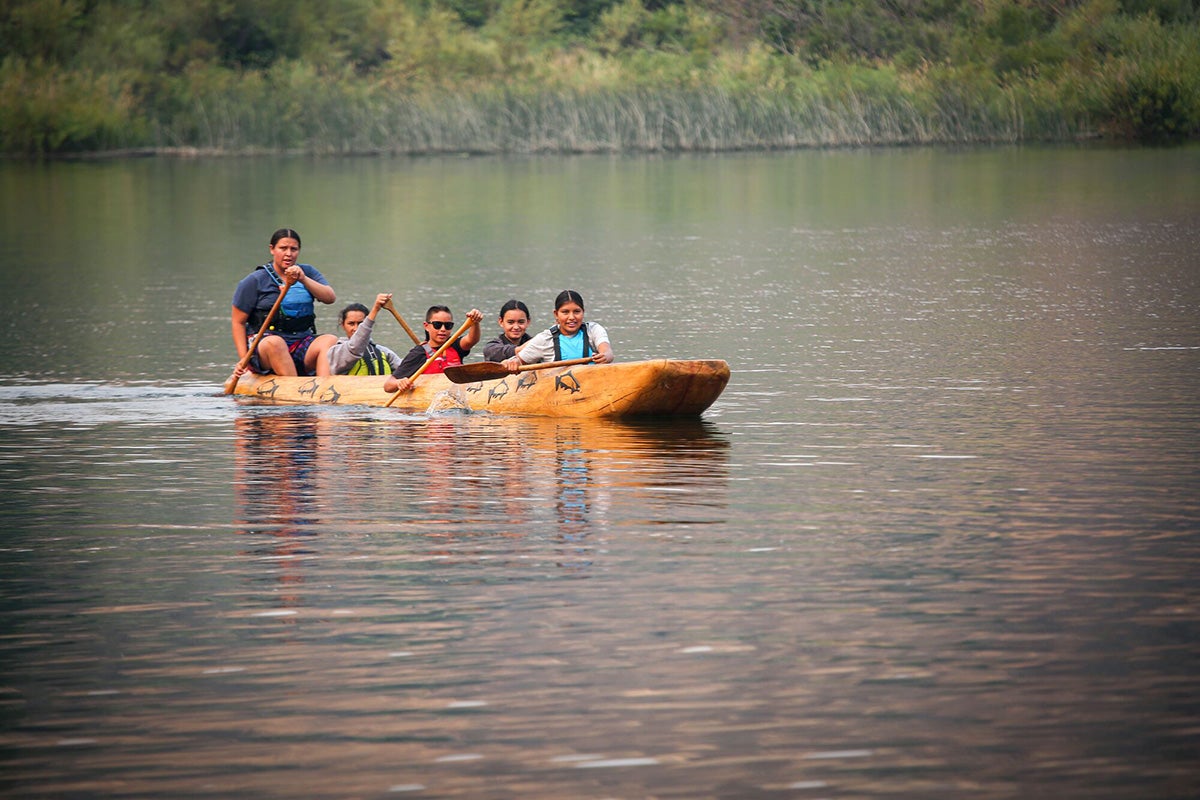Federal Report Underscores Need to Protect Columbia Basin Salmon for Tribal Justice
Tribal Circumstances Analysis acknowledges historic, ongoing and cumulative injustice to Tribes from the Columbia Basin dams and need for immediate action
Contact
A new federal analysis released today by the U.S. Department of Interior documents how in less than a century, from the 1900s to the 1970s, a series of federal and private dams constructed across the Columbia River Basin devastated natural ecosystems that since time immemorial had sustained abundant salmon, other native fish, wildlife and plants, and the basin’s Tribes.
The damming of the Columbia River and its tributaries inundated hundreds of thousands of acres of land, displaced Tribal members, flooded hundreds of cultural sites, destroyed or rendered inaccessible Tribal fishing and foraging areas, and decimated wild salmon, steelhead and other native species, according to the U.S. Department of Interior’s Tribal Circumstance Analysis. This resulted in an historic and ongoing transfer of wealth from the Tribes to others in the Basin, and historically and currently impedes Tribes’ abilities to realize the benefits of their reserved Treaty rights.
Tribes have documented information on the impacts of these dams for decades, but this analysis marks the first time the federal government has comprehensively acknowledged these impacts and its own role in perpetuating this injustice.
Earthjustice and the groups it represents commend the analysis for recognizing Tribal injustices that for too long have been ignored, and for clearly highlighting the need for action from the federal government to address these longstanding and ongoing inequities.
These actions should include prioritizing substantial increases in federal funding for basin restoration, including fully funding the Columbia Basin 10-year fish needs plan once finalized (a forthcoming plan developed under the U.S. Government Commitments). It should also include working directly with Tribes on energy planning, fish and ecological restoration, working collaboratively with partners across the basin to timely implement the U.S. Government Commitments that were part of the Resilient Columbia Agreement signed last December, and working collaboratively to fully implement the Columbia Basin Restoration Initiative (CBRI), a comprehensive blueprint to restore the Columbia Basin developed by the Yakama, Nez Perce, Umatilla, and Warm Springs Tribes and the states of Oregon and Washington.
Additionally, future environmental analyses of the Columbia River System Operations must be informed by this analysis, including a decision on whether the federal government should recommend that Congress authorize breaching four dams on the Lower Snake River to rebuild the salmon populations that originate there.
“This truth-telling from the federal government is a critical step toward remedying historical and ongoing injustice to Columbia Basin Tribes,” said Earthjustice Senior Attorney Amanda Goodin. “The health of salmon, these rivers, and the Tribes are inextricably linked. This report underscores the imperative for the Administration and Congress to take all actions necessary to rebuild healthy and abundant salmon and other native species across the Basin, including substantial increases in funding across the Basin and Congressional authorization to breach four Lower Snake River dams.”
The analysis, done in collaboration and coordination with Tribes, studied the effects of 11 federal dams along the Columbia and Snake Rivers on the nearest eight Columbia Basin Tribes. The analysis is one of the U.S. government commitments promised in the Resilient Columbia Basin agreement, signed last December by the federal government, the four lower Columbia Treaty Tribes — Yakama, Nez Perce, Warm Springs, and Umatilla — the states of Oregon and Washington, and conservation, fishing and renewable energy groups represented by Earthjustice.
The federal analysis builds on a Presidential Memorandum issued by President Biden in September 2023 that directed all relevant federal agencies to use their authorities and available resources to restore healthy and abundant salmon, steelhead, and other native fish populations in the basin, while also securing a clean and resilient energy future for the region, supporting agriculture and investing in climate resiliency.
According to the analysis, dams benefited the region by providing electric power generation, irrigation, navigation and mitigating flood risk, but at the detriment of salmon, steelhead, and other native species, ecosystem health, and Tribal rights. Today, 13 of the basin’s salmon and steelhead populations are listed as threatened or endangered while four others have gone extinct. Only about two million salmon and steelhead now return to the Columbia Basin annually, less than 10% of historical runs with two thirds of those fish consisting of hatchery fish.
In signing treaties with the United States in the mid-1800s, the Lower Columbia River Treaty Tribes (the Confederated Tribes of the Warm Springs Reservation of Oregon, the Confederated Tribes and Bands of the Yakama Nation, the Confederated Tribes of the Umatilla Indian Reservation and the Nez Perce Tribe) reserved the right to fish in perpetuity at their usual and accustomed places wherever those places may be located in exchange for ceding millions of acres to the federal government. Other Tribes, such as those in the Upper Columbia Basin who exercise on-reservation fishing rights, can no longer even harvest at their traditional on-reservation sites because dams block salmon from reaching their reservations.
These rights, intended to preserve Tribal members’ ways of life, have been eroded along with the decline of salmon and other native foods, the analysis notes.
More Information: Press Release from Nez Perce Tribe

Additional Resources
About Earthjustice
Earthjustice is the premier nonprofit environmental law organization. We wield the power of law and the strength of partnership to protect people's health, to preserve magnificent places and wildlife, to advance clean energy, and to combat climate change. We are here because the earth needs a good lawyer.